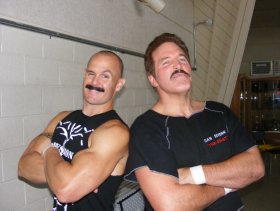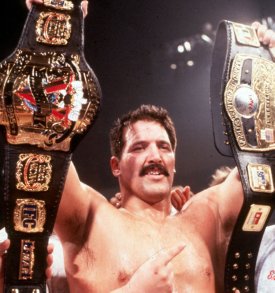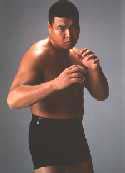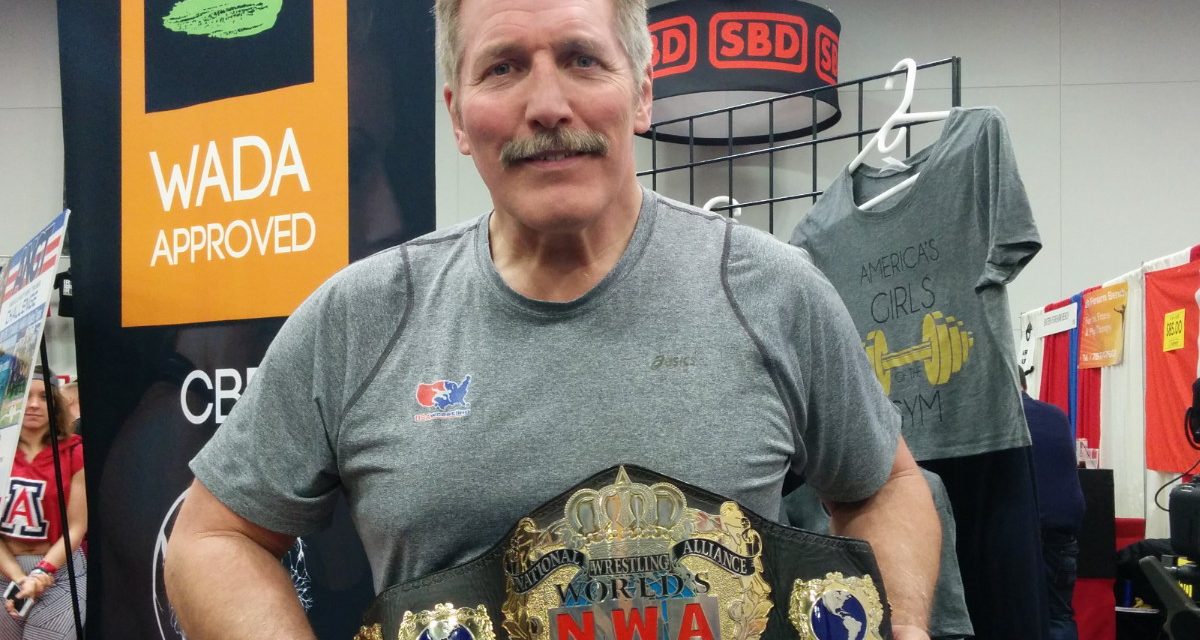Dan Severn never set out to be a shoot fighter, UFC fighter or professional wrestler, but he ended up being one of the best fighters of his generation. The former University of Arizona All-American amateur wrestler stumbled into the sport of professional wrestling because of the Olympics.
At the 1992 Barcelona Olympics, professional basketball players from across the globe, most notably from the NBA, were finally allowed to participate in the event. Severn, an amateur wrestling standout, saw the chance to make some money and still be able to compete in the sport he loved. “I had been approached by several independent wrestling companies throughout the 1980s. I did not turn pro at that time because I would have lost my amateur eligibility and would not have been allowed to pursue making the world teams or making the Olympic teams,” said Severn. “That was still was my first love — amateur wrestling. But as of the ’92 Olympics a ruling came down from the Olympic committee that allowed athletes to be both amateur and professional simultaneously as long as you were not involved in a high school or collegiate athletic program. Well, I was already well past my collegiate eligibility so I could have my cake and eat it too. So I started pursing professional wrestling as of the ’92 Olympics.”
While not a professional wrestling fan when he entered the sport, Severn enjoyed it in his younger days. “I watched it more during my junior high years. Every Sunday morning Big Time Wrestling would come on with The Sheik, Bobo Brazil, Flying Fred Curry, the likes of those kind of people,” recalled Severn with fondness. “I enjoyed it then. My parents lost a few pieces of furniture grabbing one of your brothers and airplane spinning him and, of course the couch was a perfect place to do a body slam. It was a lot of fun.”

Jaxson Jarvis and Dan Severn
When Severn began his training he jumped into it with fervour. “I will give the most credit (for training him) to Danny Cass, [and] Al Snow,” said Severn. “Danny had Slammers Gym and introduced me to Al Snow. I pursued it so aggressively, the normal timeframe to become a professional wrestler, nothing pertaining to me was normal because I was aggressively going after it. A lot of reasons why I pursued it as aggressively as I did is I used my real name, my amateur wrestling credentials.”
Severn admits that the transition from amateur to pro did have a few bumps along the way. “The biggest aspect was in amateur you always viewed the opposition as an opponent and so you really don’t care about the opponent,” said Severn. “You are looking to beat the opponent so the mindset was the most difficult part going from opponent to a partnership.”
While Severn might be considered a scientific wrestler, his style can be looked at as scientifically rough. “I work rather snug. I know no other way,” said Severn. “Some people would call me the pipe wrench to describe it, but rest assured your body is safe with me and that is the most basic, unwritten rule of professional wrestling. When you and I are in that ring together I protect you and you protect me. The ironic part is I have been hurt far worse in my professional rasslin’ career than I have in all of my cage matches combined and that is almost a contradiction of terms.”
Perhaps the aspect of the pro game that Severn had the most difficulty with was the theatrics or storytelling of the match. “Now the common traits that both industries share is there is physical preparation and there is the mental mind set,” said Severn. “The big difference is in a cage fighting match all you gotta do is walk out there and get results. It doesn’t have to look good. It doesn’t have to last that long. It could be ten seconds and you’re done! But in a professional wrestling environment, a show, you may be doing a 10-, 15-, 20-minute [match] of give and take, telling a story to people.”
With his pro career still in its infancy Severn met a person who changed the course of his fighting career. “I only had a few matches under my belt when a gentleman from Nashville, Tennessee asked me if this stuff was legit and I said it was,” said Severn. “He said you ought to be over in Japan doing this shoot fighting, shoot wrestling. I had never heard of that before so I gave him a business card.”
Three days later he received a phone call, ten days later he went to Nashville for a try-out for a sport he knew nothing about. Three days later Severn arrived in Tokyo, Japan in front of 12,000 people ready for his debut. “I did not really have a clue what I was doing,” remembered Severn. “My Asian opponent kicked me a half dozen times really, really hard. I grabbed him, closing the distance real quick and started bodily launching him all the way around this ring and dismantle him much to the crowd’s appreciation. The interpreter said, ‘Dan Severn, you will become a superstar in Japan.’ I said, ‘I don’t know about a superstar but I am not going to let someone pick me apart without repercussions.’ This was the old UWFI.”
While in Japan Severn met two gentlemen who he grew to admire, former NWA World champion Lou Thesz and Billy Robinson. “I didn’t really know who Lou was in the beginning,” said Severn. “I first met Lou Thesz and Billy Robinson on my very first trip to Japan. As I learned who they were and I learned more about them, they were studying me because I am out there working out. Lou would make comments like, ‘Dan you are really mechanical. You understand your science.’ Well thank you. Then the Internet was around more and more so I started looking up those particular names and I suddenly realized who I was actually speaking to.”
After working in Japan, Dan Severn would go on to win the NWA World Heavyweight wrestling championship in 1995 from Chris Candido in the same year he won the UFC Superfight Heavyweight championship. “The NWA was near extinction,” said Severn. “There wasn’t much notoriety in there and I am not sure if it was [promoter] Dennis Coralluzzo, his idea, but the idea came down that they wanted to put the strap on me.”
 Dan Severn with a UFC title and the NWA World title. |
After learning about the history of the belt and the men who held it, Severn had a sense of pride to be a part of that lineage. “If you go back to really the old school days there have been some real legendary people who have held the strap,” said Severn. “That particular strap right there [Severn pointed to his NWA belt] was presented to me by Lou Thesz, so it has that much more of a cherished meaning to me. As much as Ric Flair might have said he was ‘The Man,’ Lou Thesz was ‘The Man’ in my opinion.”
The NWA title returned to the forefront for fight fans in 1995 at the UFC 5 tournament, which Severn won. By winning the UFC title Severn became the first professional wrestling champion to win the crown as King of the Cage match. “There was a great deal of controversy because the first belt I ever won in my life was the NWA belt and the UFC was up in arms when I requested that the NWA belt be carried out to one of their events because they did not want that association,” said Severn. “I just said, ‘Do you want me? Or do you not want me?’ Well, they wanted me so I go, ‘Rest assured, I am not going to do anything that is going to embarrass the product.’ I am the throwback from days gone by. I probably should have been born into a different time era being a wrestler of true capabilities like the Frank Gotch era.”
One of his most interesting encounters with the NWA World title happened when he was a challenger to the belt held by Naoya Ogawa. A promoter in Texas had the champion, Ogawa, on his card and he needed a worthy opponent for the match up. Soon enough Dan Severn was asked to face the champ.
 Naoya Ogawa |
|
|
“In the locker room environment, we were talking about the match and they wanted the match to go for about two minutes,” said Severn. “We were both basically end up with an ankle lock on each other, roll out of the ring, double countout, Ogawa retains the belt. Ogawa doesn’t speak English and there was an interpreter and the promoter was there. So I smiled and said, ‘Fine’. The promoter says, ‘That match is going to suck.’ I go, ‘Yes it will. The first two minutes it’s gonna suck.’ He says, ‘What do you mean the first two minutes? The match is going for two minutes.’ I go, ‘No, I am here to do something. The first two minutes are going to suck. How long is the match regulated for? Thirty minutes? Then we are going to wrestle for 30 minutes.'”
Severn wanted to give the fans their money’s worth and a short match was not acceptable. “The first two minutes are going to suck and the next 28 are going to be the most interesting people are going to see because at that point in time it will be actual physical ability whether it be professional wrestling, whether it be amateur wrestling, judo, jiu jitsu, whatever skills he has verses whatever skills I have,” said Severn with a smile. “Again the first two minutes sucked and as they were counting me out a rolled back into the ring at eight and broke the count.”
To say that the champion was shocked would be an understatement. “Ogawa’s eyes got big. What’s happening now? I don’t even know what’s happening now,” said Severn. “All I know is I am there and when it hits the regulation mark and it goes ding, ding, ding and rings the bell and he retains the belt because no one won I got a chant for five more minutes and we went an additional five minutes on top of that. I didn’t talk to him afterwards. I am sure he was mad. I just looked at the promoter and asked, ‘Are you happy?’ He was ecstatic and that is all that matters.”
In 2002 Dan Severn reclaimed the NWA World championship, but his reign ended on a sour note. The NWA and Jeff Jarrett’s TNA had entered into a partnership that would see the NWA belt become the recognized championship of the upstart TNA promotion. “They (TNA) either had a Tuesday night or Wednesday night pay per view is what they had going,” said Severn. “At that time I used to keep my schedule right up on my website and I already had a cage match that I had agreed to do for that date. They were cool with it and said they would bring me in down the road. Well, their ticket sales were doing poorly so they go from not wanting to do something to a heavyweight title defence. I go, ‘I can’t do it. When I give my word, your word should mean something.’ It shouldn’t really be a contract, so I am old school, a hand shake and your word should be enough. That is not the way it is done now. I couldn’t do it and they said they would strip me of the belt. In hindsight they wanted me to ship the belt to them. What I should have said was, ‘No, you can send whoever you want to come and get it.’ I wish I would have done that because I gave so much for that organization, just over all credibility and then to treat me like that? I didn’t have a whole lot of respect for the NWA from that point forward.”
The NWA and TNA later parted ways, and both organizations are still going. As is Dan Severn, the original throwback.
RELATED LINKS

